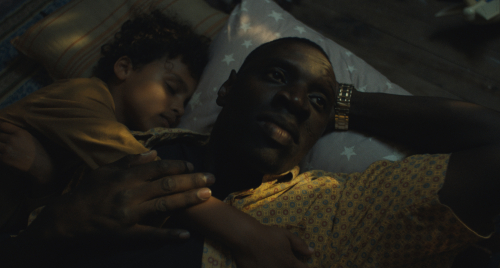
Philistine Films
MOVIE REVIEW
The Strangers’ Case (2024)
A lot of people do not give a lot of thought to immigration except to wonder why all these people are suddenly here when they could just stay at home. What “The Strangers’ Case” does is walk us, step by painful step, through the awful things that lead to a small boat in desperate trouble arriving in Greek waters. It does this with perfect staging and acting, an enormous sense of urgency and a pointed beginning and ending that could make you cry. The title is even a quote from Shakespeare, for heaven’s sake. Unfortunately, “The Strangers’ Case” is too calculated in how it tugs at our heartstrings and it tries so hard to make its point that it backfires.
The movie links together the stories of how five adults and their families end up on that boat, most of whom are from the same neighborhood in Aleppo, Syria. There’s Amira (Yasmine Al Massri), the widowed doctor; Mustafa (Yahya Mahayni), the soldier; Marwan (Omar Sy), the people smuggler; Fathi (Ziad Bakri), the poet and father, and Stavros (Constantine Markoulakis), the Greek coast guard captain. Amira has ended up on the run in a Turkish refugee camp after treating a soldier from one side in her hospital, which so irritated the other side that they bombed her parents’ home, killing her entire family. She and her daughter, Rasha (Massa Daoud), were only saved through the quick work of The White Helmets and the bravery of a people smuggler.
The smuggler in Turkey, Marwan, is a single father to a small, sick son (Carlos Chahine) who dreams of eating pizza in Chicago. We are shown this side of Marwan first, so we understand people are complicated when he pulls his gun on the people fighting over lifejackets for his small boat. He makes it perfectly clear he doesn’t care what happens once he has their money, as the refugee camps are full of thousands more potential customers.
Mustafa has a bravura sequence where he, under orders from a hateful secret policeman, must drag a 10-year-old boy out of his mother’s arms and into the street to be shot. This rattles him so badly he sneaks off to compose himself by smoking a cigarette in an abandoned sniper’s nest. Later he must make a split-second decision and when asked about it later only says he was in the right place at the right time. Stavros is a decent man, so committed to saving people from the Mediterranean that a friend says even God himself phones Stavros when he’s in trouble. He’s haunted with nightmares, though, and worries about the impact his choices are having on his own young son; Mr. Markoulakis makes a very strong impression as someone about to be smothered by his own goodness. Fathi has the smallest part, but the one which involves the most suffering.
The movie is bookended with scenes of Amira in a hospital in Chicago where another doctor (Jason Beghe) is struggling with a pediatric patient. This start and finish means we know Amira survives – and Ms. Al Massri does superb work carrying the weight of the world on her shoulders – but it ties things up with too neat a bow. Mr. Beghe is a well-known television actor in police procedurals and it’s something of a surprise that he’s lent his presence to this cameo part. But his presence will mean a wider American audience might be willing to give this movie a chance. Ms. Al Massri has also built a career in American television, while Mr. Sy and Mr. Markoulakis are big stars in France and Greece respectively. This means “The Strangers’ Case” is guaranteed distribution in at least those countries; writer-director Brandt Andersen has clearly calculated all the angles. But it’s this sense of calculation that’s the main takeaway from the film.
It's difficult to explain how pervasive that sense becomes since there is nothing really wrong here, just that everything is over-engineered. There’s no true moment of raw feeling, not even when Fathi’s small daughter, Sara (Sara El Debuch), is made to leave her puppy behind. She doesn’t even cry; and when she shortly gets injured apologizes to her mother for causing a mess. This is unlike most upset and/or bleeding 6-year-olds in real life, but this movie wants noble suffering and to make the rest of us feel bad. This is not a badly made film, not at all, but it puts its thumb on the scale so hard we know we’re being cheated. It’s a remarkable shame.
Comments